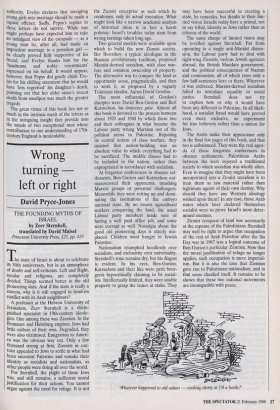Wrong turning — left or right
David Pryce-Jones THE FOUNDING MYTHS OF ISRAEL by Zeev Sternhell, translated by David Maisel Princeton University Press, £25, pp. 419 Thhe state of Israel is about to celebrate its 50th anniversary, but in an atmosphere of doubt and self-criticism. Left and Right, secular and religious, are completely divided. Things seemed better in the old pioneering days. And if the state is really a success, why is it still engaged in head-on conflict with its Arab neighbours?
A professor at the Hebrew University of Jerusalem, Zeev Sternhell is a distin- guished specialist in 19th-century ideolo- gies. One among these was Zionism. In the Romanov and Habsburg empires, Jews had little culture of their own. Degraded, they were also victimised. Emigration to Ameri- ca was the obvious way out. Only a few thousand strong at firsts Zionists in con- trast appealed to Jews to settle in what had been ancestral Palestine and remake their identity as socialists and nationalists, as other people were doing all over the world.
For Sternhell, the plight of these Jews was, and still remains, a sufficient moral Justification for their actions. You cannot argue against the need for refuge. It is not the Zionist enterprise as such which he condemns, only its actual execution. What might look like a narrow academic analysis of historical ideas is in fact a harsh polemic: Israel's troubles today stem from wrong turnings taken long ago.
Two general models were available upon which to build the new Zionist society. Ber Borochov, a typical ideologue in the Russian revolutionary tradition, proposed Marxist-derived socialism, with class war- fare and common ownership of property. The alternative was to conquer the land as opportunity arose, pragmatically, and then to work it, as proposed by a vaguely Tolstoyan idealist, Aaron David Gordon.
The most influential of Gordon's disciples were David Ben-Gurion and Berl Katznelson, his eminence grise. Almost all this book is devoted to the process between about 1920 and 1940 by which these two and their colleagues in what became the Labour party wrung Marxism out of the political arena in Palestine. Rejecting its central notion of class warfare, they insisted that nation-building was an absolute value to which everything had to be sacrificed. The middle classes had to be included in the nation, rather than expropriated in accordance with socialism.
At forgotten conferences in obscure set- tlements, Ben-Gurion and Katznelson out- manoeuvred their opponents, smashing Marxist groups or potential challengers. Meanwhile they were setting up and domi- nating the institutions of the embryo national state. By no means agricultural workers conquering the land, the usual Labour party members made sure of having a well paid office job, and some were corrupt as well. Nostalgia about the good old pioneering days is utterly mis- placed. Children went hungry in Jewish Palestine.
Nationalism triumphed heedlessly over socialism, and exclusivity over universality. Sternhell's tone remains dry, but his disgust is evident. In his eyes, Ben-Gurion, Katznelson and their like were petit bour- geois hypocritically claiming to be social- ists. Intellectually limited, they were unable properly to grasp the issues at stake. They may have been successful in creating a state, he concedes, but thanks to their lim- ited vision Israelis today have a primal, not to say tribal, identity as Jews rather than as citizens of the world.
The same charge of limited vision may be levelled against Sternhell. Far from operating in a single anti-Marxist dimen- sion, the Labour party had to deal with right-wing Zionists, various Jewish agencies abroad, the British Mandate government, and the political consequences of Nazism and communism, all of which rates only a few half-sentences here or there. Wherever it was enforced, Marxist-derived socialism failed to introduce equality or social justice. Sternhell does not try to explain how or why it would have been any different in Palestine. In all likeli- hood, a socialist Israel would have proved even more exclusive, an experiment for true believers rather than a nation for Jews.
The Arabs make their appearance only in the final few pages of this book, and that too is unbalanced. They were the real agen- da of those forgotten conferences in obscure settlements. Palestinian Arabs between the wars enjoyed a traditional society to which socialism was wholly alien. Even to imagine that they might have been incorporated into a Zionist socialism is to treat them as raw material rather than legitimate agents of their own destiny. Why should they have any Western ideology wished upon them? In any case, those Arab states which later declared themselves socialist were to prove Israel's most deter- mined enemies.
Zionist conquest of land was necessarily at the expense of the Palestinians. Sternhell may well be right to argue that occupation of the rest of Arab Palestine after the Six Day war in 1967 was a logical outcome of Ben-Gurion's particular Zionism. Now that the moral justification of refuge no longer applies, such occupation is mere imperial- ism. But it is also the case that Zionism gave rise to Palestinian nationalism, and in that sense checked itself. It remains to be shown that these two national movements are incompatible with peace.
`Whatever happened to old values — cooking sherry at 116 a bottle?'


























































 Previous page
Previous page